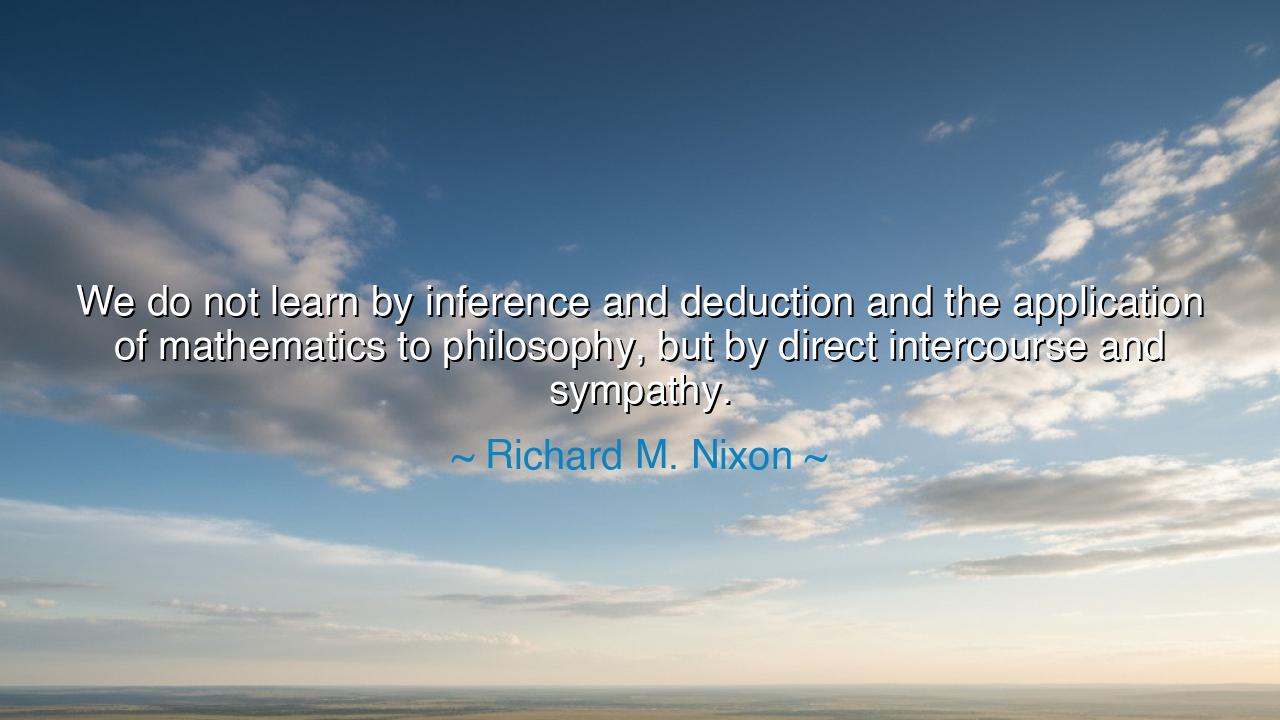
We do not learn by inference and deduction and the application
We do not learn by inference and deduction and the application of mathematics to philosophy, but by direct intercourse and sympathy.






When Richard M. Nixon declared, “We do not learn by inference and deduction and the application of mathematics to philosophy, but by direct intercourse and sympathy,” he spoke of a truth older than logic itself: that the heart of human learning is not in cold abstraction, but in living contact, in sympathy between souls. His words remind us that while reason sharpens the mind, it is experience, relationship, and understanding that truly shape the human spirit. Knowledge, if stripped of human warmth, becomes barren; but knowledge infused with sympathy becomes wisdom.
The origin of this idea lies deep in the ancient ways of teaching. The philosophers of Greece wrote much, but more often they taught in person, face to face, through dialogue. Socrates himself did not leave behind writings; his wisdom survived through his conversations, through the sympathy and challenge of direct exchange. Students did not merely study his words, they felt his presence, they absorbed his passion. This is what Nixon alludes to—that learning is born in the crucible of human contact, not in the solitude of formulas and deductions alone.
Consider the story of Helen Keller and Anne Sullivan. Helen did not learn language, courage, or dignity through abstract systems. She learned because one woman touched her hand, guided her patiently, and poured sympathy into her teaching. Through that human connection, words sprang into life and meaning. This story is a testament to Nixon’s insight: the deepest lessons come not from calculation, but from direct intercourse of hearts, where one life shapes another through compassion.
The meaning of Nixon’s words can also be seen in the failures of cold reasoning alone. History is filled with examples where brilliant intellect divorced from sympathy led to cruelty. Empires justified conquest through “logic,” regimes defended oppression through “rational deduction.” But without sympathy, without understanding the pain and dignity of others, reason becomes a sword rather than a light. True learning demands not only the mind’s sharpness but also the heart’s openness.
The lesson for us is profound: if we wish to learn deeply, we must seek out not only books, but people. We must enter into conversation, into listening, into the practice of empathy. The teacher who inspires us does more than deliver facts—they awaken our spirit through their passion. The friend who challenges us does more than argue—they shape our thinking through their presence. Knowledge grows richest where there is human connection, for truth is not a thing cold and distant, but something alive between souls.
What, then, should you do? First, seek learning not only in solitude but in fellowship—talk with others, listen to their stories, let their lives become your teacher. Second, when you guide others, offer not only facts but sympathy, for without sympathy, knowledge cannot take root. Third, remember that wisdom cannot be reduced to equations or deductions; it requires the humility to meet another person as equal, as teacher, as fellow traveler on the path of life.
Thus, let Nixon’s words be remembered: “We do not learn by inference and deduction... but by direct intercourse and sympathy.” This is not a rejection of reason, but a reminder that reason must be clothed in humanity. For it is not formulas that change us, but encounters; not logic alone that transforms us, but love. And the greatest learning of all is to see ourselves not as solitary minds, but as part of a great fellowship of souls, each teaching, each learning, through the eternal gift of sympathy.






AAdministratorAdministrator
Welcome, honored guests. Please leave a comment, we will respond soon